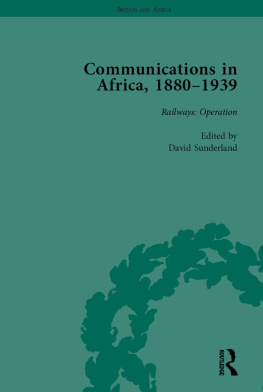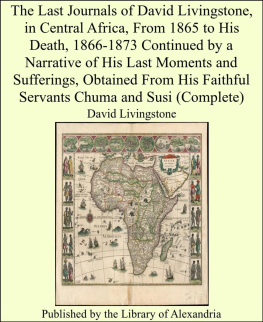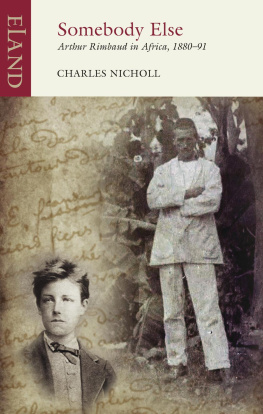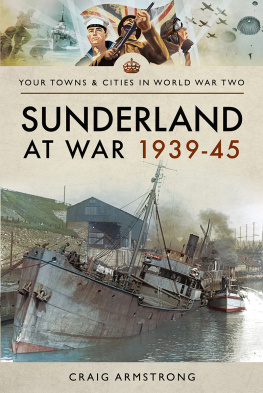BRITAIN AND AFRICA SERIES
COMMUNICATIONS IN AFRICA, 18801939
BRITAIN AND AFRICA SERIES
Series Editor: | David Sunderland |
Advisory Editor: | Godfrey N. Uzoigwe |
TITLES IN THIS SERIES
Economic Development of Africa, 18801939
David Sunderland (ed.)
FORTHCOMING TITLES
The Government and Administration of Africa, 18801939
Casper Andersen and Andrew Cohen (eds)
CONTENTS OF THE EDITION
VOLUME 1
General Introduction
Railways: Proposals
VOLUME 2
Railways: Construction
VOLUME 3
Railways: Operation
VOLUME 4
Railways: Operation and Economic Impact
VOLUME 5
Other Forms of Communication
Index
COMMUNICATIONS IN AFRICA, 18801939
GENERAL EDITOR
David Sunderland
ADVISORY EDITOR
Godfrey N. Uzoigwe
Volume 3
Railways: Operation
First published 2012 by Pickering & Chatto (Publishers) Limited
Published 2016 by Routledge
2 Park Square, Milton Park, Abingdon, Oxon OX14 4RN
711 Third Avenue, New York, NY 10017, USA
Routledge is an imprint of the Taylor & Francis Group, an informa business
Copyright Taylor & Francis 2012
Copyright Editorial material David Sunderland 2012
To the best of the Publishers knowledge every effort has been made to contact relevant copyright holders and to clear any relevant copyright issues. Any omissions that come to their attention will be remedied in future editions.
All rights reserved, including those of translation into foreign languages. No part of this book may be reprinted or reproduced or utilised in any form or by any electronic, mechanical, or other means, now known or hereafter invented, including photocopying and recording, or in any information storage or retrieval system, without permission in writing from the publishers.
Notice:
Product or corporate names may be trademarks or registered trademarks, and are used only for identification and explanation without intent to infringe.
BRITISH LIBRARY CATALOGUING IN PUBLICATION DATA
Communications in Africa, 18801939. (Britain and Africa)
1. Railroads Africa Planning Sources. 2. Railroads Africa Design and construction History 19th century Sources. 3. Railroads Africa Design and construction History 20th century Sources. 4. Railroads Africa Management History 20th century Sources. 5. Railroads Africa Economic aspects History 19th century Sources. 6. Railroads Africa Economic aspects History 20th century Sources. 7. Communication and traffic Africa History 19th century Sources. 8. Communication and traffic Africa History 20th century Sources. 9. Great Britain Colonies Africa Administration History 19th century Sources. 10. Great Britain Colonies Africa Administration History 20th century Sources.
I. Series II. Sunderland, David.
385.09609034-dc23
ISBN-13: 978-1-84893-064-3 (set)
Typeset by Pickering & Chatto (Publishers) Limited
CONTENTS
The majority of British African railways were operated by local administrations. As discussed in the General Introduction in Volume 1, Rhodesian and early South African lines were built and operated by private companies, but were gradually acquired by the state (see Hammond, Report on the Railway System of Southern Rhodesia (1925), below; Smith, Special Railway Commissioner, upon the Administration, Organisation and Working of the Natal Government Railways (1903), below; and Herbert Frankel, Memorandum on Railway and Harbours Working and Finance (1933), below). In West Africa (see Hammond, Report on the Sierra Leone Government Railway (1922), below), Uganda, Kenya (apart from the KonzaMagadi railway) and Tanganyika (see Hammond, Report on the Railway Systems of Kenya, Uganda and Tanganyika (1921), below, and Hammond, Report on the Railway System of Tanganyika Territory (1930), below) all the lines were publicly built and managed in West Africa by individual country authorities, and in Uganda and Kenya after the First World War, by the East African Railways Corporation.1 Proposals that government constructed lines be operated by the private sector were swiftly dismissed by both the Crown Agents and the Colonial Office. It was pointed out that contractor-run railways in the UK were poorly managed, that the absence of cost and revenue information would discourage contractors bidding for the management of railways and that those that did tender would submit excessively low offers that colonial officials would have difficulty judging. The local government would also be obliged to continue to bear its public responsibility as regards safety and would have to closely and expensively monitor operations to prevent the setting of excessive freight rates.2
Although they contributed greatly to economic development, the majority of lines were commercially unsuccessful.3 Losses were the result of both high costs and low revenues. Costs were raised by the basic nature of construction; in West Africa, by the poor quality of the lines built; various problems with expatriate and African labour; and inadequate organization of railway departments. The higher operating costs that arose from basic construction are summarized in Table 1; while a good example of a railway with high running costs caused by poor quality construction is the Gold Coast SekondiKumasi line. The steep gradients and tight curves of the railway restricted the haulage capacity of engines, badly laid track demanded almost continuous track maintenance and replacement, poorly built river crossings led to bridge speed limits, the failure to cut a wide right-of-way through forest increased the incident of falling trees that blocked and damaged track, and grades, curves and track problems resulted in numerous derailments and accidents.4
Table 1: The Impact of Lines of a Lower Standard on Operating Costs and Carrying Capacities.5
Pioneer feature | Impact on operating costs |
Corrugated iron pipes | Increased incidence of costly washouts and slips |
Incomplete earthworks | Higher maintenance costs |
Light rails | Less durable than heavy rails; light engines essential |
Narrow gauge rolling stock | Relatively expensive and small. More prone to breakdown than broader gauge counterpart. Smaller trucks increased empty haul-age and siding needs |
Narrow gauge track | Comparatively unsafe and subject to costly accidents. Truck size has little effect on administration and supervision, the largest component of working costs |
Native wood sleepers | Shorter lifespan and required more maintenance than steel sleepers |
Restricted station accommodation | Loading difficulties |
Trestle bridges | More likely to collapse than stone bridges |
Costs were further increased by the appointment of advisory consulting engineers and expatriate staff. In order to ensure that completed lines worked efficiently and economically, their operation in the Crown colonies was initially supervised by consulting engineers, who provided advice on rates, staffing and management structures and track and equipment purchase and maintenance.6 For these duties, the West African consulting engineer, Frederic Shelford, received an annual salary plus expenses and recruitment and purchasing fees.7 Not surprisingly, Shelfords work was subject to a number of criticisms. It was argued that his remuneration was excessive, a claim supported by a comparison of consulting engineer/Crown Agent operation fees (see Table 2); in order to maximize his own income and avoid criticisms of the operation of lines, he recommended the purchase of expensive rolling stock and staff; and he failed to closely monitor the working of lines. He rarely visited Africa and his knowledge of railway operations was based on generally out-of-date reports and correspondence with general managers, who could easily omit information. More importantly, he insisted that completed lines be managed by highly remunerated general managers, selected by himself, and that colonial government involvement should be kept to a minimum, even when it was plain that railway departments were being inefficiently administered. Aware that Shelfords supervision of the operation of railways was as inadequate as his construction of them, the Crown Agents in 1904 sought to take over some of his duties, but were repulsed by the Colonial Office. A further attempt in 1911 was more successful, and, by the start of the First World War, they had acquired most of his workload.8











